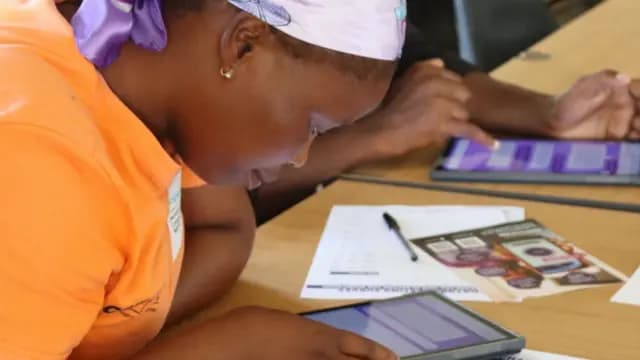We're loading the full news article for you. This includes the article content, images, author information, and related articles.
As Kenya confronts a devastating femicide crisis, a South African digital platform born from tragedy provides a potential blueprint for leveraging technology to offer anonymous support and secure evidence for victims of gender-based violence.

NAIROBI, Kenya – On Monday, 3 November 2025 (EAT), as Kenya continues to grapple with alarming rates of violence against women, a technological solution from South Africa is drawing attention as a potential tool in the fight. The platform, Gender Rights in Tech (Grit), and its AI-powered chatbot Zuzi, were born from a personal tragedy that mirrors the grim reality faced by countless families across the continent, including in Kenya.
In 2020, South African social entrepreneur Leonora Tima was devastated by the murder of her 19-year-old relative, who was nine months pregnant when her body was found by a highway near Cape Town. [26, 27] The killer was never found, and the crime received no media coverage—a silence Tima attributed to the sheer normalization of such violence in South African society. [26] This experience became the catalyst for creating Zuzi, an AI 'aunt' designed to provide a safe, anonymous space for survivors of Gender-Based Violence (GBV).
"I wanted to create tech-driven solutions that empower survivors, ensuring they receive the urgent help, legal guidance and emotional support they need without barriers," Tima stated in a February 2025 interview. [34]
The context for Zuzi's creation is a GBV crisis in South Africa of staggering proportions. The country's femicide rate is approximately six times the global average, a figure that has earned it the grim title of one of the most dangerous places in the world to be a woman. [16, 29] In the 2019/2020 period, a woman was murdered every three hours. [12] This environment of extreme violence underscores the need for innovative, accessible support systems.
Developed by Tima's non-profit, Grit (formerly Kwanele), Zuzi is a multilingual chatbot available on low-data platforms like WhatsApp and Facebook. [5, 7] It was co-designed with over 2,000 individuals from marginalized communities, including youth, sex workers, and LGBTQIA+ people, to ensure it is trauma-informed and relevant to their needs. [5] The platform offers more than just conversation; it provides guidance on legal rights, connects users to services, and features a digital vault where survivors can securely store evidence like photos and police reports for potential legal action. [5, 34] The app, which had 12,000 users as of February 2025, has been recognized with awards from the Bill & Melinda Gates Foundation and Mozilla. [26, 34]
The story of Zuzi's origins resonates deeply within Kenya, which is facing its own escalating femicide and GBV emergency. According to the Africa Data Hub, at least 500 women and girls have been murdered in Kenya since 2016. [9] The year 2024 was dubbed “the deadliest year on record for Kenyan women” by a collaborative report from Africa Uncensored and Odipo Dev, which documented nearly 200 killings, a 79% increase from 2023. [31] Nairobi County recorded the highest number of these murders. [31]
The crisis sparked widespread public outrage, culminating in nationwide protests in January 2024, where thousands marched under the banner #StopKillingUs to demand government action. [9, 20] Data from a 2022 national survey revealed that about a third of Kenyan women have experienced physical violence in their lifetime. [8, 14] A UN Women-commissioned study presented in September 2025 found that 40% of Kenyan women have experienced intimate partner violence. [28]
In response, the Kenyan government has taken some steps, including promoting its 24/7 toll-free GBV hotline, 1195, and launching a digital awareness campaign in June 2025. [35] However, activists argue that systemic failures in protecting women persist, and the justice process remains slow. [31, 40] The rise of Technology-Facilitated Gender-Based Violence (TFGBV), including online harassment and AI-driven abuse, presents a new and complex frontier in this battle. [28, 38]
The Zuzi chatbot represents a survivor-centric technological approach that could complement existing efforts in Kenya. Its emphasis on anonymity directly addresses the powerful social stigma that prevents many survivors from reporting abuse. [6] The evidence-gathering feature is particularly relevant in a context where cases often collapse due to a lack of securely stored proof. [30]
While Kenya has seen local tech initiatives like the Bonga App in the past, the comprehensive, co-designed, and AI-driven nature of Grit offers a more advanced model. [18] For any such tool to be effective in Kenya, it would need to address significant barriers, including the digital divide, data privacy concerns, and varying levels of digital literacy, particularly in rural areas. [13]
However, the principle behind Zuzi—an accessible, African-built tool that empowers survivors with information and support—provides a compelling case study. As Leonora Tima's work has shown, technology, when designed with and for the most vulnerable, can be a powerful force for justice. For Kenya, exploring similar innovations could be a critical step in turning the tide against the shadow pandemic of violence that continues to claim the lives of its women and girls.
Keep the conversation in one place—threads here stay linked to the story and in the forums.
Sign in to start a discussion
Start a conversation about this story and keep it linked here.
Other hot threads
E-sports and Gaming Community in Kenya
Active 9 months ago
The Role of Technology in Modern Agriculture (AgriTech)
Active 9 months ago
Popular Recreational Activities Across Counties
Active 9 months ago
Investing in Youth Sports Development Programs
Active 9 months ago